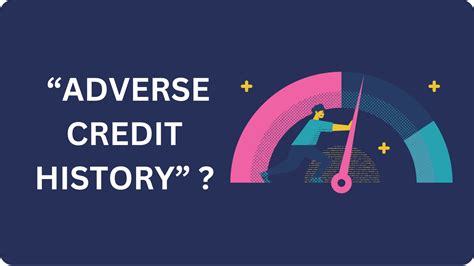Definition
An adverse credit history is a record of negative financial actions that have impacted an individual’s creditworthiness. This can include missed or late payments, collections, foreclosures, and bankruptcies. Credit bureaus collect this information and maintain it in credit reports, which lenders use to evaluate creditworthiness.

Consequences of an Adverse Credit History
An adverse credit history can have significant consequences for individuals, including:
- Increased interest rates: Lenders charge higher interest rates to individuals with poor credit histories as they perceive them as higher risk. This can lead to higher monthly payments and higher overall borrowing costs.
- Limited access to credit: Individuals with adverse credit histories may find it difficult to obtain new loans and credit cards. Lenders may deny applications or offer limited credit limits at unfavorable terms.
- Higher insurance premiums: Insurance companies often use credit scores to assess risk when setting insurance premiums. Individuals with poor credit histories may face higher premiums for auto, home, and other types of insurance.
- Difficulty securing housing and employment: Landlords and employers may review credit reports as part of their screening processes. An adverse credit history can make it harder to secure housing or obtain employment.
Causes of an Adverse Credit History
Various factors can contribute to an adverse credit history:
- Missed or late payments: Even a single missed payment can negatively impact credit scores.
- Collections: Unpaid debts often result in collections, which are reported to credit bureaus and damage credit scores.
- Foreclosures and bankruptcies: These are major credit events that severely impact creditworthiness and can remain on credit reports for years.
- Credit utilization: Using too much of one’s available credit limit can also negatively affect credit scores.
- Identity theft: Fraudulent activity can damage credit reports and lead to an adverse credit history.
Impact on Consumers
An adverse credit history can have a significant impact on consumers’ financial well-being and overall quality of life:
- Financial stress: Increased interest rates and limited access to credit can lead to financial difficulties and increased debt.
- Missed opportunities: Individuals with poor credit histories may miss out on opportunities for financial growth, such as obtaining a mortgage, investing in education, or starting a business.
- Reduced self-esteem: An adverse credit history can affect individuals’ self-esteem and confidence in managing their finances.
- Social stigma: In some cases, individuals with poor credit histories may face social stigma and discrimination.
Repairing an Adverse Credit History
Repairing an adverse credit history can be a challenging but necessary process. Individuals can take several steps to improve their credit scores:
- Pay bills on time: Timely payments are essential for rebuilding credit.
- Resolve outstanding debts: Contact creditors to negotiate repayment plans and remove collections from credit reports.
- Dispute errors on credit reports: Review credit reports regularly and dispute any inaccurate or outdated information.
- Build positive credit: Obtain a secured credit card or become an authorized user on someone with a good credit history.
- Seek professional credit counseling: Credit counselors can provide guidance and support in developing a plan for credit repair.
Tips and Tricks
- Monitor credit reports regularly: Check credit reports from all three major credit bureaus (Equifax, Experian, and TransUnion) to identify errors and track progress.
- Set up payment reminders: Use automated payment systems or set up reminders to avoid missed payments.
- Negotiate with creditors: Reach out to creditors to discuss payment arrangements and potential hardship programs.
- Consider a debt consolidation loan: This can simplify debt management and potentially reduce interest rates.
- Be patient and persistent: Rebuilding credit takes time and consistent effort. Avoid quick-fix solutions and focus on long-term financial stability.
Conclusion
An adverse credit history is a serious issue that can have far-reaching consequences for individuals. By understanding the causes, implications, and steps involved in repairing a poor credit history, consumers can take control of their financial future and improve their overall well-being.
